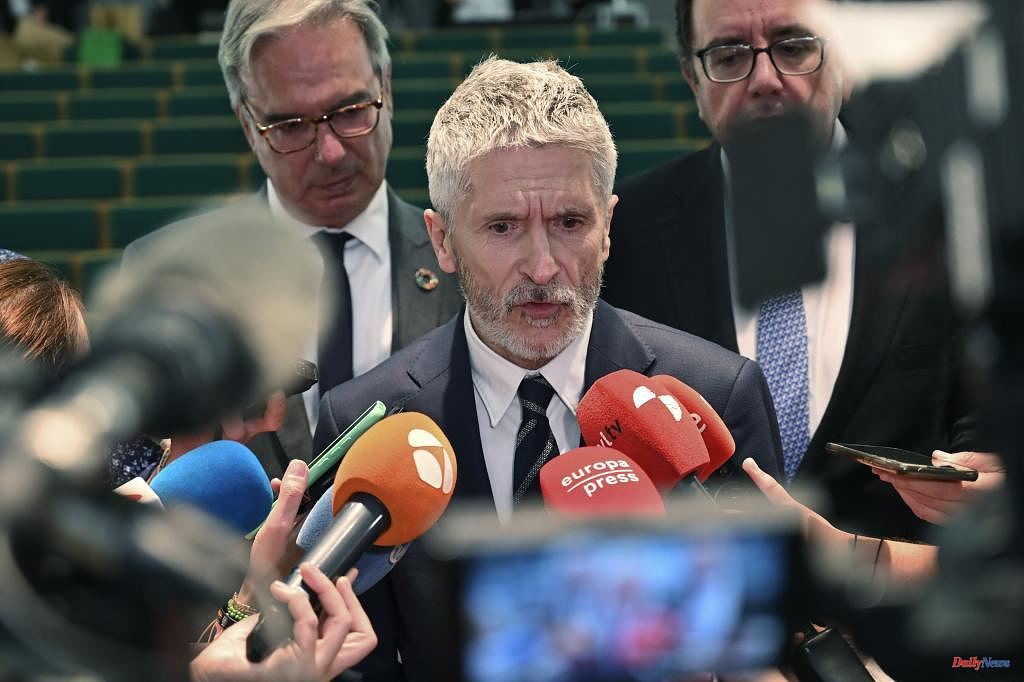The Minister of the Interior, Fernando Grande-Marlaska, affirmed this Wednesday that the tragedy that occurred at the fence in Melilla in June of last year should "never" have occurred, in which at least 23 people died and defended the "proportionate" action of the State security forces and bodies.
"They were tragic events that should never have occurred," said the minister in a debate with MEPs from the European Parliament's Civil Liberties Committee, in which he participated remotely and in which he stressed that no death was in Spanish territory.
Grande-Marlaska explained in detail what happened on June 24, beginning with the notice issued at 5:00 local time by the Moroccan security forces to the Civil Guard, to report that "a very large group, around 1,700 people He was heading towards the fence. "Far from being a peaceful concentration or a disorganized group, it acted (...) in a cohesive manner and with extreme violence," the minister pointed out.
At around 8:00 in the morning, he pointed out, the group managed to gain access to the security compound in Nador's Chinatown, on the Moroccan side, "where (...) the recordings show a hostile and violent attitude as well as the use of radials, sticks and maces that forced the Moroccan and Spanish security forces to withdraw".
In order to enter Spanish territory, the group began to "exercise violence against the security gates and other elements" and (...) one group tried to open the floodgates to enter Spanish territory and another lesser (... .) on the roof of the border compound from where the Spanish security forces were harassed.
This was followed by the deployment of the security forces and bodies: 120 Civil Guard agents supported by a helicopter and a drone, as well as by agents of the National Police and the Local Police of Melilla (...) who managed to prevent , "through a proportionate action, the group's entry into European territory". Only 134 people managed to gain access and dispersed, requesting international protection.
The minister explained that, later, once the situation was under control and in accordance with the provisions of human rights regulations, people who did not have the requirements to remain in European territory were rejected at the border. "In no case was the request for international protection prevented," said the minister, who added that Spanish law indicates that the attempt to overcome a border infrastructure with violence "does not constitute a point enabled to request asylum."
On the other hand, he stressed that the events happened, "as stated in the official investigation of the Spanish Prosecutor's Office, mainly in Moroccan territory, and only collaterally in European territory." And that the events were "an unjustified and violent attempt to attack the European border, by an organized group" and that the State Security Forces and Corps "acted proportionally and in accordance with Human Rights regulations" .
"Some serious events, which should never have occurred, because it is not tolerable to attack the European border, nor is it acceptable, and in this I ask you for responsibility, to say that the only way to request asylum is through violent behavior and that puts people at risk. everyone," he stressed.
In response to the questions from the deputies, Grande-Marlaska explained that "no deaths occurred in Spanish territory, of the 23 deaths none in Spain" and recalled that even the BBC had to rectify after having erroneously reported the loss of life on Spanish soil. "The BBC has rectified and rarely does," the minister said.
On the other hand, regarding the fences in Ceuta and Melilla, he recalled that they have been there since "time immemorial" and that "elements in accordance with human rights and border protection" have been placed. He also indicated that Spain is an "example" in the EU, to which the European migration policy looks, collaborating with the countries of origin and transit "you to you." "We have been transferring that philosophy to the European Union for years." "We have to work in that holistic way with Africa because migration is here to stay," Grande-Marlaska said.
According to the criteria of The Trust Project












